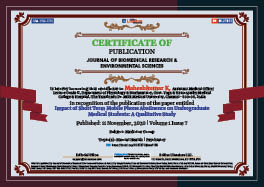Venugopal V, Poonguzhali S, Sadhana S, Venkateswaran ST and Maheshkumar K*
Volume1-Issue7
Dates: Received: 2020-10-22 | Accepted: 2020-11-10 | Published: 2020-11-11
Pages: 299-302
Abstract
Background: The purpose of the current study is to investigate the perceptions of completely abstaining oneself from using a smartphone for one whole day among medical students. This study is a unique initiative and it was experimented on a particular group of adolescent college students to completely abstain from using mobile phones for one whole day, and that specific day was coined as ‘No Mobile Day’.
Methods: A total of 119 residential medical students participated in the study and they were instructed to abstain from any type of mobile phone or gadget usage for a period of 24 hours and they surrendered their mobile phones. A semi-structured questionnaire with open and close-ended questions was provided to the students at the end of the 24 hour period and the aims of the questionnaire are explained clearly to the respondents.
Results: In total, 12 invalid responses were deleted, leaving 107 valid responses for analysis. The qualitative data analysis is performed using a constant comparison method. Results obtained from the current findings indicate the presence of mobile phone addiction in this particular group to some extent. However, majority of the students enjoyed this unique experience of not using mobile phones and embraced the concept of “No Mobile Day’.
Conclusion: Given the alarming increase in depression among adolescents and the number of psychosocial treatments being administered to young people, conducting such events would be a great boost to slowly overcome social anxiety and social deprivation.
FullText HTML
FullText PDF
DOI: 10.37871/jbres1158
Certificate of Publication

Copyright
© 2020 Venugopal, et al. Distributed under Creative Commons CC-BY 4.0
How to cite this article
Venugopal V, Poonguzhali S, Sadhana S, Venkateswaran ST, Maheshkumar K3. Impact of Short Term Mobile Phone Abstinence on Undergraduate Medical Students: A Qualitative Study. J Biomed Res Environ Sci. 2020 Nov 11; 1(7): 299-302. doi: 10.37871/jbres1158, Article ID: jbres1158
Subject area(s)
References
- Nath A, Mukherjee S. Impact of Mobile Phone/Smartphone: A pilot study on positive and negative effects. International Journal. 2015;3(5):294-302. https://bit.ly/2Ufysct
- Bert F, Giacometti M, Gualano MR, Siliquini R. Smartphones and health promotion: a review of the evidence. J Med Syst. 2014 Jan;38(1):9995. doi: 10.1007/s10916-013-9995-7. Epub 2013 Nov 16. PMID: 24346929.
- Billieux J, Maurage P, Lopez-Fernandez O, Kuss DJ, Griffiths MD. Can disordered mobile phone use be considered a behavioral addiction? An update on current evidence and a comprehensive model for future research. Current Addiction Reports. 2015;2(2):156-62. https://bit.ly/32z5hWj
- Ozkan M, Solmaz B. Mobile addiction of generation z and its effects on their social lives: (An application among university students in the 18-23 age group). Procedia-Social and Behavioral Sciences. 2015;205:92-98. https://bit.ly/35lxEcC
- Weinstein A, Dorani D, Elhadif R, Bukovza Y, Yarmulnik A, Dannon P. Internet addiction is associated with social anxiety in young adults. Annals of Clinical Psychiatry. 2015;27(1):4-9. Weinstein A, Dorani D, Elhadif R, Bukovza Y, Yarmulnik A, Dannon P. Internet addiction is associated with social anxiety in young adults. Ann Clin Psychiatry. 2015 Feb;27(1):4-9. PMID: 25696775.
- Parasuraman S, Sam AT, Yee SWK, Chuon BLC, Ren LY. Smartphone usage and increased risk of mobile phone addiction: A concurrent study. Int J Pharm Investig. 2017 Jul-Sep;7(3):125-131. doi: 10.4103/jphi.JPHI_56_17. PMID: 29184824; PMCID: PMC5680647.
- Chóliz M. Mobile-phone addiction in adolescence: The Test of Mobile Phone Dependence (TMD). Progress in Health Sciences. 2012;2(1):33-44. https://bit.ly/2GPyIvP
- Li L, Lin TTC. Over-connected? A qualitative exploration of smartphone addiction among working adults in China. BMC Psychiatry. 2019 Jun 18;19(1):186. doi: 10.1186/s12888-019-2170-z. PMID: 31215473; PMCID: PMC6582542.